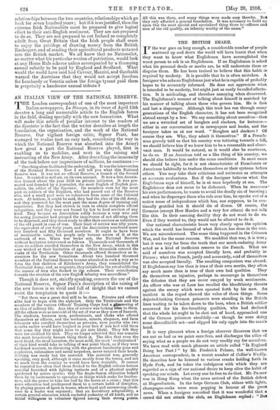AN ITALIAN VIEW OF THE NATIONAL RESERVE. T HE London correspondent
of one of the most important Italian newspapers, La Stamps, in its issue of April 13th devotes a long and memorable article to the English forces in the field, dealing specially with the new formations. What will make this article of peculiar interest to the readers of the Spectator is the fact that the writer describes at length the foundation, the organization, and the work of the National Reserve. Our vigilant foreign critic, Signor Prati, has manaaed to realize (not an easy task, considering the way in which theNational Reserve was absorbed into the Army) how great a part the National Reserve played, first in enabling us to mobilize, and next in the raising and instructing of the New Army. After describing the immensity of the task before our improvisers of millions, he continues :- " One thing alone facilitated the undertaking. It was the intervention of the National Reserve. Now I will tell you what this National Reserve was. It was not an official Reserve, a branch of the Second Line. It existed in mid-air, on its own account. It was a free Associa- tion formed about the year 1910 on private initiative. It Was pro- moted and founded by a journalist, the most English of English jour- nalists, the editor of the Spectator. Its members were for the most part ex-soldiers of the Regulars, who had passed out of the Reserve also, and a small part were ex-volunteers from some of the Colonial ware. At bottom, it might be said, they had the élan of the old Army, and they possessed for the most part the same degree of training and experience. But they had striven in vain to obtain complete official recognition, and they were not bound by law to lend services of any kind. They became an Association solely because a very wise and far-seeing journalist had grasped the importance of not allowing them to be dispersed, and they stood ready to offer their services as volunteers of the old guard in case of war. Their limit of service was fifty years, the equivalent of our forty years, and the Association numbered some two hundred and fifty thousand members. It ought to have been of inestimable value, but people only became aware of it at the outbreak of war. When war broke out, the National Reserve without hesitation intervened as follows. Thousands and thousands of these ex-soldiers enrolled themselves in the New Army, which in this case winked at their limitation of age. Other thousands entered the ranks of the Territorials. Other thousands offered themselves as in- structors for the new formations. About two hundred thousand members of the National Reserve became absorbed in such a way as to form the first skeleton of Kitchener's Army, they consolidated the Territorial Army, and, as sergeants, they initiated in the art of soldiering the masses of men who flocked to thy colours. Their contribution towards the creation of the new English infantry was marvellous."
Though it does not, strictly speaking, concern the use of the National Reserve, Signor Prati's description of the raising of the new forces is so vivid and full of insight that we cannot resist the temptation to quote it :— "But there was a great deal still to be done. Privates and officers alike had to begin with the alphabet. Only the Territorials and the members of the various Officers' Training Corps had a .amering of an idea of military life. Any idea of science was lacking iten to them. All the others were as innocent of the art of war as they were of Sanscrit. The students, business men, professionals, and clerks who offered themselves as officers, and the workmen, miners, shopmen, and farm labourers who enrolled themselves as privates, were youths who two months earlier would have laughed in your face if you had told them that some day they might have to get into khaki. They felt they were too civilized for that. They no longer admitted that war remains the most tenaciously human thing there is. The idea that even the most timid, the most harmless, the most mild, the most ' evolutionized ' of their kind would take to talking of war point blank, as if they were hardened warriors, to discussing with the greatest familiarity guns and explosives, submarines and aerial torpedoes, never entered their heads. Nothing was ready but the material. The material was, generally speaking, very good, although it came mostly from the towns, and not so much from the country as would have been desirable. It cannot be repeated too often that there flocked to the English colours human material furnished with fighting instincts and of a physical quality quickened by active sports ; that the Anglo-Saxon education helped them by its incitements to specialize in things which make for fearless- ness, and the power to take the bull by the horns at a crisis ; that this same education had predisposed them to a certain habit of discipline, by playing games of sport in teams, where loyal and unswerving obedi- ence to a leader was enjoined ; that an hereditary adaptability, a certain general education which excluded pedantry of all kinds, and an initial willingness to volunteer figured among their strong points. All this was there, and many things were made easy thereby. But they only afforded a general foundation. It was necessary to build up upon this the most special and specialized thing there is—officers and men of the old quality, an infantry worthy of the name."






























 Previous page
Previous page